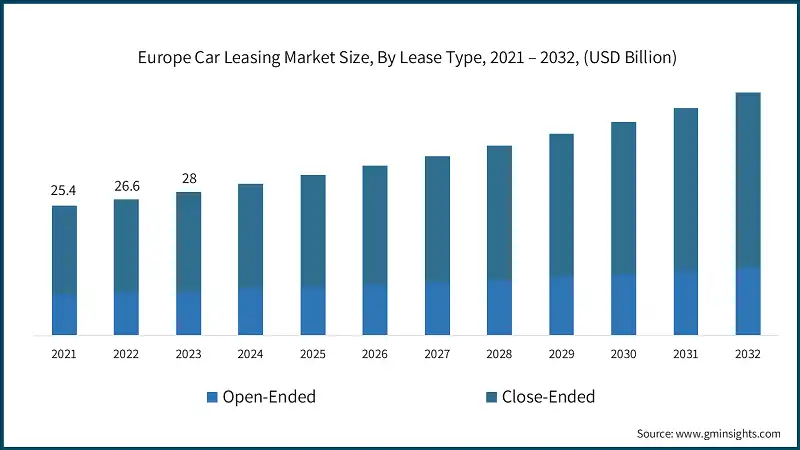Get a free sample of Europe Car Leasing Market
Thank you!
Your inquiry has been received. Our team will reach out to you with the required details via email. To ensure that you don't miss their response, kindly remember to check your spam folder as well!
Form submitted successfully!
Error submitting form. Please try again.
Get a free sample of Europe Car Leasing Market
Thank you!
Your inquiry has been received. Our team will reach out to you with the required details via email. To ensure that you don't miss their response, kindly remember to check your spam folder as well!
Form submitted successfully!
Error submitting form. Please try again.
Europe Car Leasing Market Analysis

Based on lease type, the market is segmented into open-ended and close-ended. In 2023, the close-ended segment accounted for over 65% of the market share and is expected to exceed USD 30 billion by 2032. Close-ended leases offer customers fixed monthly payments for the duration of the lease. This predictability appeals to both businesses and individuals, helping them to avoid unexpected costs tied to car ownership, such as depreciation and maintenance. With set terms, close-ended leases provide clarity on expenses, enabling effective budgeting without financial surprises at lease-end.
Customers in a close-ended lease aren't accountable for the car's market value once the lease concludes. Regardless of market-driven depreciation or model changes, the customer simply returns the vehicle. This feature holds particular significance in Europe, where the transition to electric vehicles (EVs) and swift technological changes complicate predictions of vehicle resale values. This is expected to drive the growth of segment during the forecast period.

Based on application, the Europe car leasing market is divided into commercial and individual. The commercial segment held around 71% of the market share in 2023. Leasing enables businesses to manage extensive vehicle fleets without incurring substantial upfront costs. This method ensures predictable, fixed monthly expenses, simplifying budgeting for businesses, particularly SME. Many European countries offer tax deductions on leased vehicles, further encouraging businesses to lease rather than purchase.
Furthermore, leasing preserves capital, allowing reinvestment into core operations and enhancing efficiency. As environmental responsibility becomes a priority, companies increasingly lease electric or hybrid vehicles to meet ESG goals and reduce carbon footprints. Leasing electric vehicles also offers businesses greater cost-effectiveness and flexibility compared to ownership. This is expected to drive the adoption of car leasing among businesses.

Germany car leasing market accounted for 23% of the revenue share in 2023 and is poised to reach around USD 9 billion by 2032. The presence of large industrial and corporate sector in Germany is driving the demand fleet leasing among both SME and large enterprises. Corporate customers are leasing vehicles to lower the financial burden of fleet ownership to newer, more efficient vehicles. Companies operating in German market are focused on strategic acquistions to enhance their leasing services in the country.
For instance, in January 2024, Mobilize Lease&Co, the subsidiary of Mobilize Financial Services acquired Mobility Concept and MeinAuto, divisions of the MeinAuto Group, a major player in the German car leasing market. The acquisition will speed up the deployment of full services leasing offers on the German market to meet the new mobility needs of customers.
In Europe, heightened environmental awareness and stringent EU regulations are propelling the demand for electric vehicle leasing. In response, numerous leasing firms are broadening their EV fleets, catering to businesses and consumers who wish to reduce their environmental footprint without the financial burden of ownership.
In North America, sectors such as logistics, transportation, and delivery services are increasingly leaning towards leasing. They value fleet management services that optimize vehicle utilization, cut costs, and streamline logistics. Additionally, North American consumers are gravitating towards leasing for its lower monthly payments compared to traditional car loans. This preference enables them to access newer models equipped with cutting-edge technology and safety features, all without the weight of long-term financial commitments.
Countries such as China, India, and regions in Southeast Asia are witnessing rapid urbanization, leading to a surge in demand for adaptable mobility solutions, notably car leasing. Urban population in congested urban centers of the region, are turning to leasing to sidestep the financial and logistical challenges of vehicle ownership, such as parking and maintenance. Moreover, the Asia-Pacific region is seeing a rise in corporate fleet leasing, driven by an influx of multinational corporations and local enterprises. Industries including IT, manufacturing and logistics are choosing leasing as a strategy to lower upfront capital outlay and enhance operational efficiency.
How big is the Europe car leasing market?
The market size for car leasing in Europe reached USD 28 billion in 2023 and is set to grow at a 6.1% CAGR from 2024 to 2032, driven by the transition towards electric vehicles (EVs) and the increasing availability of EV models.
How significant is the commercial segment in the Europe car leasing industry?
The commercial segment held around 71% of the market share in 2023, as leasing enables businesses to manage extensive vehicle fleets without substantial upfront costs.
What is the projected market size of Germany's car leasing market?
Germany's market is projected to cross USD 9 billion by 2032, led by the demand from the large industrial and corporate sectors.
Who are the major players in the Europe car leasing industry?
Major players in the industry include Alphabet, Arval BNP Paribas, Athlon, Ayvens, Free2Move Lease, Hertz Lease, Leasys, Mobilize Lease&Co, Sixt Leasing, and Volkswagen Financial Services.